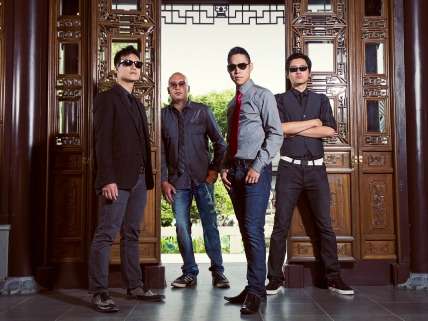SCOTUS Seems Inclined to Nix the Ban on 'Disparaging' Trademarks
The government struggles to justify the rule that stopped The Slants from registering the name of their band.

Comments during yesterday's oral argument in Lee v. Tam, a First Amendment case in which an Asian-American dance rock band called The Slants is challenging the federal ban on registration of "disparaging" trademarks, suggest a majority of the Supreme Court is inclined to overturn the 71-year-old rule. In addition to skeptical questions from three conservative justices, Deputy Solicitor General Malcom Stewart's defense of the trademark policy faced strong challenges from two left-leaning justices that he had trouble countering.
Justice Stephen Breyer asked Stewart to identify a legitimate government interest served by the Lanham Act clause barring registration of trademarks that "may disparage…persons, living or dead, institutions, beliefs, or national symbols." Stewart said the rule is aimed at avoiding terms that "distract the consumer from the intended purpose of the trademark qua trademark, which is to identify [the] source" of the product or service. Breyer was clearly not satisfied by that response, saying he could come up with "perhaps 50,000 examples of instances where the space the trademark provides is used for very distracting messages, probably as much [as] or more so than the one at issue." Later Breyer repeatedly summarized Stewart's position in a way that suggested he did not think much of it.
Justice Elena Kagan emphasized that the disparagement clause draws a distinction based on viewpoint, since it allows positive messages but prohibits negative ones. "I always thought that government programs were subject to one extremely important constraint, which is that they can't make distinctions based on viewpoint," she said. Under the ban challenged by The Slants, she noted, "you can say good things about some person or group, but you can't say bad things about some person or group….I would have thought that that was a fairly classic case of viewpoint discrimination."
Stewart conceded that a trademark restriction approving praise of politicians but forbidding criticism of them would constitute viewpoint-based discrimination. But he argued that the breadth of the disparagement rule, which applies to all groups of people, makes it less problematic because it means the government is not trying to suppress specific messages. "That's like saying it does so much viewpoint-based discrimination that it becomes all right," a skeptical Kagan replied.
The point is crucial because viewpoint-based speech regulation is subject to "strict scrutiny," which makes it presumptively unconstitutional. It can pass muster only if it is narrowly tailored to serve a compelling government interest. Even if we assume that preventing consumer distraction "from the intended purpose of the trademark qua trademark" is a compelling government interest, a rule that applies only to disparagement is clearly not narrowly tailored. Stewart himself conceded that the disparagement rule cannot survive strict scrutiny, meaning it will be upheld only if the Court decides it is not a viewpoint-based speech regulation.
The government maintains that the disparagement clause is not really a speech regulation because it merely sets a requirement for obtaining benefits the government has no obligation to provide. Chief Justice John Roberts was unpersuaded. "I'm concerned that your government program argument is circular," he said. "The claim is you're not registering…my mark because it's disparaging, and your answer is, 'Well, we run a program that doesn't include disparaging trademarks, so that's why you're excluded.'"
Pressed by Justice Samuel Alito, Stewart admitted that "it would be unconstitutional to deny copyright protection" for a book that was deemed disparaging. But he argued that copyright "is much more tied to First Amendment values" than trademark because "the incentivization of free expression" is one of its main functions. By contrast, he said, "trademarks generally have not historically served as vehicles for expression." Justice Anthony Kennedy did not seem to buy that distinction, observing that "we have a culture in which we have T-shirts and logos and rock bands and so forth that are expressing a point of view."
Justice Ruth Bader Ginsburg noted that "there's also a large concern with vagueness here." The fact that disparagement has no clear meaning makes trademark registration decisions unpredictable, to the point that the very same term may be approved in one context and rejected in another. The example Ginsburg mentioned was Heeb as the name of a magazine (which is a registered trademark) vs. Heeb as the name of a clothing line (which was denied registration because it was judged disparaging). As New York Times legal reporter Adam Liptak notes, Ginsburg "could have said the same thing about 'Dago,' 'Injun' and 'Squaw.'" Stewart replied that the Patent and Trademark Office "receives 300,000 trademark applications every year, so it's not surprising that there is some potential inconsistency." Justice Sonia Sotomayor underlined Ginsburg's point about vagueness, suggesting that Stewart's excuse is "another way to say it's not clear enough for them to get it right."
Given his views regarding commercial speech, Justice Clarence Thomas (who as usual did not speak during oral argument) seems likely to join Kennedy, Roberts, and Alito in seeing the disparagement clause as inconsistent with the First Amendment. That would doom the clause if Breyer, Kagan, Ginsburg, or Sotomayor agreed, and the first two seemed especially underwhelmed by the government's defense of the rule.
Reason TV covers Lee v. Tam:


Show Comments (31)